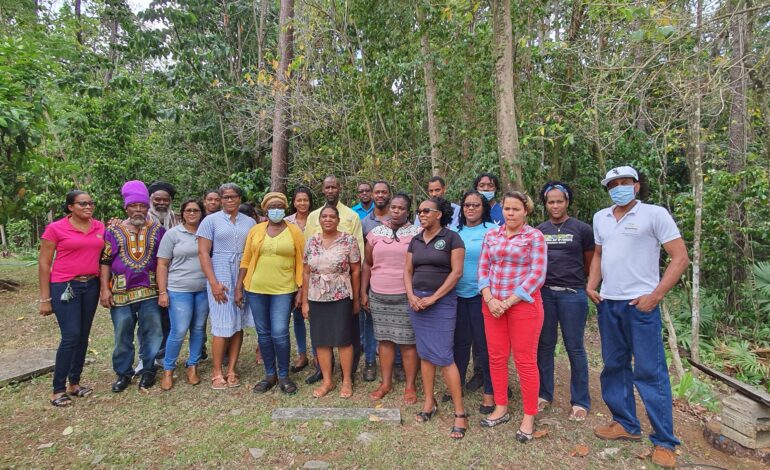
The local forests in Saint Lucia are critical to the tourism sector, food and agriculture resources, biodiversity, water resources and the livelihoods of many of its rural residents, among others. However, it is estimated that only40% of the island’s forests are designated as Forest Reserve with the remaining 60% of forested lands being under private tenure. Hence, The Department of Forestry with support from the Food and Agriculture Organization of the United Nations (FAO) teamed up to host a five day workshop to better equip participants on the application of participatory approaches, discovery-based extension and engagement techniques. These new skills will enable them to adopt integrated and participatory approaches when dealing with environmental, socio-economic and sustainable livelihood issues.
The workshop attended by 21 Forestry, Agricultural Extension, Agricultural Engineering and Water Resources Officers, focused on community or participatory forestry management, an effective strategy, which allows the Division of Forest & Land Resources Development to work with local communities to sustainably manage forest resources and preserve the livelihoods that depend on them.
During the first four days of the workshop, the officers were engaged in interactive sessions, which explored topics such as participatory approaches, community empowerment, stakeholder mapping and analysis, negotiation skills, conflict resolution, discovery-based extension and engagement methods. Additionally, through practical field exercises, participants were also exposed to the methodology used for conducting Rapid River Assessments (RRAs). In the next phase of the project, the skills developed during this training will be put to good use in effort to foster improved relations with communities and contribute to the sustainability of revegetation efforts along three degraded watersheds through participatory forestry.
Therese Yarde, FAO’s Regional Project Coordinator expressed the organization’s satisfaction in working with the Division of Forest & Land Resources Development to execute the project. She indicated that the project would boost the capacity for a people-centred approach to rehabilitating riverbanks and regenerating important ecosystem services that rivers provide to Saint Lucia. She stated, “The engagement and enthusiasm of the participants from the Division of Forest & Land Resources Development and other important partner agencies in the government has been extremely encouraging. FAO is looking forward to the next stage of our partnership with the Division of Forest & Land Resources Development, which will involve working with communities to revegetate the riverbanks and improve practices that are harmful to the selected rivers”.
Meanwhile, Natachia Fanus – Forest Officer, Division of Forests and Land Resources Development, stated, “I had a rewarding experience, I gained knowledge and skills. We need more courses like this to build capacity at Forestry. Job well done”
Kisha Jacob, Extension Officer, Extension Services, remarked that, “This training from FAO consultant Michael Andrew in my opinion, could not come at a better time. This has been the best training and facilitator in a long time and would be beneficial to other members of staff. Although it was a very compact four-day training, the level of interaction made it easier to grasp concepts. When I receive the presentations, I will be making them available to other members of staff, and also try my uttermost to impart the knowledge I have received. A warm thank you to FAO, Leshan Monrose and Michael Andrew and to my fellow group one team for making this possible”
The workshop ended with a closing ceremony and presentation of certificates to the participants along with featured remarks from Alwin Dornelly, Chief Forestry Officer, Souraya Niles-Regis, Deputy Permanent Secretary in the Ministry of Agriculture and Leshan Monrose, FAO National Project Coordinator. The Deputy Permanent Secretary she thanked FAO for its support and encouraged the participants to utilize the knowledge and skills developed during the workshop.






